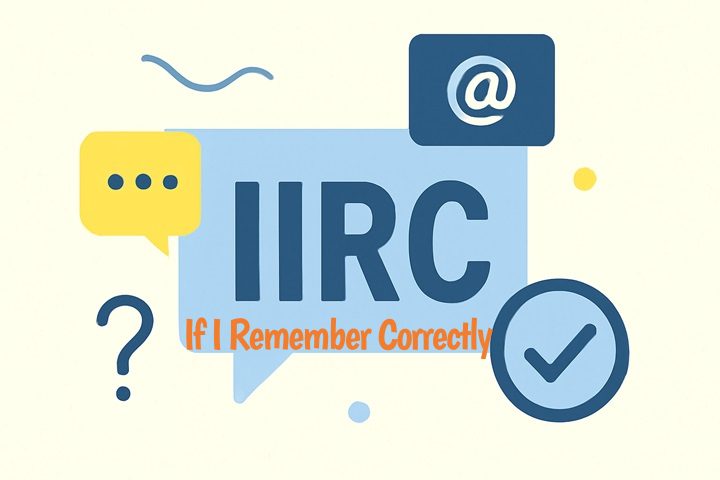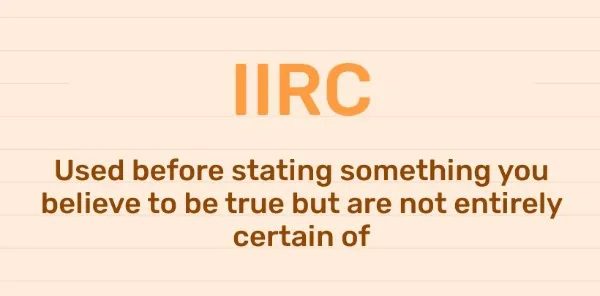Short slang and acronyms are used to save time and appear natural on the internet, particularly in teenagers’ digital conversations. According to a Preply survey of 2022, 98% of Gen Z Americans report using slang. Additionally, 30% of young people use slang in nearly every conversation. Recently, there has been growing interest in the slang term “IIRC.” However, IIRC, its meaning is something that puzzles people who are not well-versed in online lingo. This article reveals what IIRC stands for and how to use it properly. It also helps parents understand such teen slang and how to keep children safe in online communications.
What does IIRC mean in slang?
IIRC abbreviation meaning is “If I Recall Correctly” or “If I Remember Correctly.” Before a claim, people use it to indicate an apprehensive recall or doubtful assurance.
It expresses humility. IIRC tends to give the impression that you’re recalling something from memory, which might not always be correct. This expression makes the tone amicable and it does not sound overconfident.



The IIRC slang meaning is of mindfulness. This is an expression of demonstrating that you are thinking seriously about the matter at hand and not dictating that you are correct. It minimizes conflict during conversations and upholds respectful interactions, especially in large groups or online deliberations.
IIRC provides nuance as compared to other slang. It is not sarcastic or emotional. Rather, it is factual and restrained in its reasoning. This aspect has gained popularity among internet communities that emphasize equal communication, such as fandoms, academic forums, and online workspaces.
Your shortcut to understanding teen talk! Stay informed and keep an eye on their online chats.
Origins of the IIRC acronym
The origin of the IIRC abbreviation dates back to the start of the Internet age. It was first discussed on Usenet discussion boards and Internet Relay Chat (IRC) systems in the late 1980s and early 1990s. Such societies preferred short language since there was a lack of space on the typewriter and the bandwidth was low.
Terms like LOL, IMO and IIRC were used so as not to interrupt the flow of the conversation. From there, the acronym got to developers, game players and even forum debaters.
With the proliferation of internet usage, IIRC shifted to niche internet usage forums for personal communication. Such acronyms were incorporated into digital shorthand in social media platforms, blogs and communities of text messaging. Nowadays, it can be used even in professional settings, where one can informally talk about data, occurrences, or mutual memories on the internet.
On Reddit, users will link to previous posts or discussions with this slang. Users write IIRC to appear credible while allowing others to correct them. This reflects how the decades-old culture of cautious accuracy still shapes online etiquette.
How to use IIRC correctly in text?
When using IIRC meaning in text, it is important to know tone, setting, and purpose.



IIRC can appear in the following contexts:
- Civil reproach and fact-checking: It makes an intervention that does not sound too self-assured. Like, IIRC, that actor retired last year.
- Showing doubt: When showing doubt, users write IIRC to signal uncertainty about what they recall. Like: “IIRC, this model was part of the older design.”
- Memory of past events: It displays a conversational tone of submissiveness in recalling events. Like, “IIRC, we had met in that workshop in 2019.“
The aim in all that is equilibrium in a way. It demonstrates interest and consistency without exaggerating power. Its overuse or reliance in harsh situations may render your point weak.
IIRC meaning in text messages and DMs
IIRC is usually used in casual texting and DMs between known people. It expresses memorized information without complete assurance. Coupled with IIRC, this minimizes the chances of confusion or correction in the future.
Examples include:
- IIRC, Sarah is the one who designed that logo.
- IIRC, we were over that last week.
IIRC meaning on social media platforms
- On Twitter and Facebook: Mostly appear in comments, replies, or posts when sharing information that might be slightly speculative or remembered from a while ago.
- In TikTok and Instagram remarks: Less use but can appear in longer comment threads or fan community discussions when discussing facts or details related to content. People use it to recall sources or trend origins, e.g., “IIRC, that audio was recorded in 2018 as a meme.
- In gaming chats (Discord, Twitch): In gaming chats, people use IIRC to quickly recall game mechanics, lore, or previous events in a multiplayer session. This maintains coordination between players. Example: the boss will go into rage phase after five minutes, IIRC.
In all these platforms, the words ’IIRC‘ have a comparable role to play, i.e., providing a balance between certainty and humility.
When to avoid using IIRC?
Its use is not applicable everywhere. Some settings require accurate or confident speech, where ambiguity can be counterproductive to clarity. IIRC can make messages sound unprofessional or careless.
- The professional or formal writing: Do not use IIRC in business e-mails, research reports, verified statements, or academic work. It dilutes your point and leaves room for others to point out flaws in your view.
- Being very confident: IIRC is not proper if you are confident about a fact.
- Possibly offensive or contemptuous circumstances: Tone can be misread online – ‘IIRC’ may sound patronizing in sensitive talks or when touching sensitive topics, where it is preferable not to use. Such a phrasing may seem indifferent or mean-spirited in an argument or an emotional discussion.
Being mindful of tone and audience ensures IIRC adds value without causing confusion or doubt.
What can parents do to understand and engage with teen slang?
The slang of today keeps changing. Online subcultures involve the creation of new abbreviations and symbols every week. IIRC, meaning is not usually offensive, but not every slang has a well-meaning. Hence, parents’ awareness of acronyms enhances domestic communication and cybersecurity. The following are several tested methods to keep up with the times.
Promote free flow of information
Build credibility by encouraging open talks so teens feel comfortable explaining the slang they use. To be more casual, inquire of them what terms, such as IIRC, or where they have found them? Always find an interest in the approach. Civil conversation assists in developing a cooperative learning style between the children and parents.
Make use of credible web materials
Parents can decode new slang and emojis using Urban Dictionary, parenting sites, or educational blogs. After going through such pages, parents perceive digital behaviors rather than respond in dismay. For instance, Parents.com offers a guide to teen slang to help parents decode the terms their children use in text messages, TikTok, and real life. Digital literacy content presenting definitions of terms going viral on TikTok or Snapchat is also available in many schools and organizations.
Set clear online boundaries
Families should create rules for online tone, acceptable contacts, and screen time. Ask teens to share odd messages or slang that they come across. Through enhanced awareness, the parents would be able to differentiate between safe and potentially harmful communication.
Such practices facilitate good cultural digital citizenship. Knowledge of such modern slang terms is just the beginning of the broader online awareness.
Bonus: FlashGet Kids helps you receive slang alerts
FlashGet Kids is a parental control masterpiece that offers smart features to track chat language and screen habits to promote digital parenting. It has Keyword Detection, which monitors sensitive words in chat apps and social networks.
It also provides a full picture of phone activity in real-time with the help of Screen Monitoring. So, parents are able to identify the inappropriate interactions at an early stage.
FlashGet Kids is also equipped with such features as App Blocking, Screen Time Reports, and Activity Scheduling. These will provide a healthy balance between entertainment and studying. Parents are able to set settings for each child depending on the age and level of maturity.
This advanced tool can help parents better understand their children’s preferences, get involved in their online activities, and follow digital trends, rather than keeping the activity at bay.
Conclusion
IIRC means If I Recall Correctly or If I Remember Correctly. It is a minor yet important element of online communication. The term is considerate, humble, and intellectually well-meaning in the remembrance of facts, or half-remembered information.
The actual message is not just about learning one acronym but about fostering open communication between the generations. Online language changes rapidly over time, and intelligent parenting requires families to adjust to these changes, helping build closer bonds and ensuring children are in a safe, responsible online environment.

